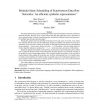Free Online Productivity Tools
i2Speak
i2Symbol
i2OCR
iTex2Img
iWeb2Print
iWeb2Shot
i2Type
iPdf2Split
iPdf2Merge
i2Bopomofo
i2Arabic
i2Style
i2Image
i2PDF
iLatex2Rtf
Sci2ools
EMSOFT
2009
Springer
2009
Springer
Modular static scheduling of synchronous data-flow networks: an efficient symbolic representation
This paper addresses the question of producing modular sequential imperative code from synchronous data-flow networks. Precisely, given a system with several input and output flows, how to decompose it into a minimal number of classes executed atomically and statically scheduled without restricting possible feedback loops between input and output? Though this question has been identified by Raymond in the early years of LUSTRE, it has almost been left aside until the recent work of Lublinerman, Szegedy and Tripakis. The problem is proven to be intractable, in the sense that it belongs to the family of optimization problems where the corresponding decision problem -- there exists a solution with size c -- is NP-complete. Then, the authors derive an iterative algorithm looking for solutions for c = 1, 2, ... where each step is encoded as a SAT problem. Despite the apparent intractability of the problem, our experience is that real programs do not exhibit such a complexity. Based on earl...
Corresponding Decision Problem | EMSOFT 2009 | Sequential Imperative Code | Software Engineering | Synchronous Data-flow Networks |
| Added | 16 Aug 2010 |
| Updated | 16 Aug 2010 |
| Type | Conference |
| Year | 2009 |
| Where | EMSOFT |
| Authors | Marc Pouzet, Pascal Raymond |
Comments (0)

